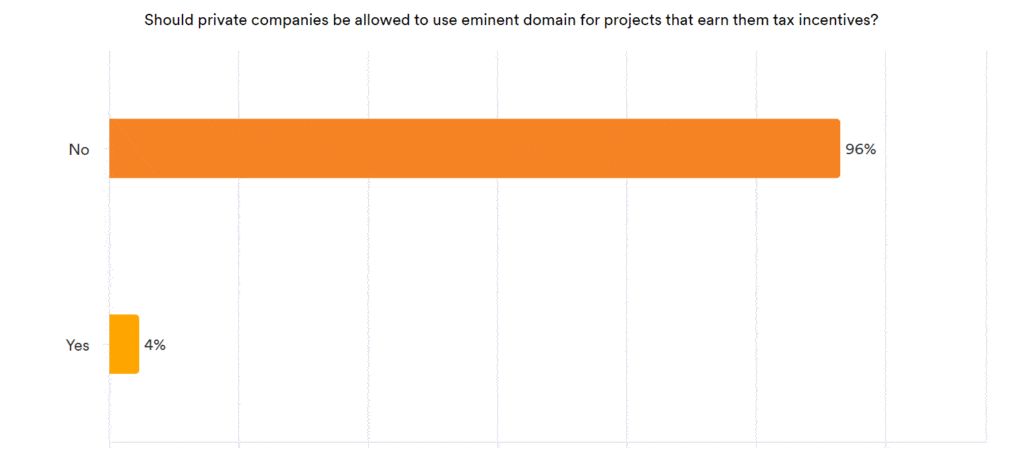Last month, the LANDTHINK Pulse posed the following question to our audience: Should private companies be allowed to use eminent domain for projects that earn them tax incentives?
Our informal online survey revealed that 96% of respondents are united in their opposition to private companies using eminent domain to force unwilling landowners to sell them access to their property. A flurry of proposed carbon pipelines in the U.S. Midwest has sparked a battle over whether companies behind the projects should be allowed to seize land from unwilling property owners to secure a route.

Summit Carbon Solutions, along with Navigator CO2 and Wolf Carbon Solutions, are three corporate groups that have proposed building pipelines that would crisscross the Midwest, spanning five states- Iowa, Nebraska, Minnesota, South Dakota and North Dakota- and remove about 12 million tons of C02 from the atmosphere annually to an underground cavity for it to calcify and become part of the rock, according to the company.
Carbon dioxide pipelines and projects raise a broader question regarding eminent domain laws, which allows private property to be seized by the government, with compensation, under a set of conditions, including whether a project is for the overall public good. The companies behind the projects first seek to negotiate voluntary easements with farmers and ranchers that would give them the legal right to dig, install and maintain the lines – which would transport carbon captured at biofuel processing plants for injection underground. If the landowners refuse easements, the companies would need to exercise eminent domain as a last resort to gain access to the land.
At issue is whether carbon pipelines serve a public purpose. The companies have argued that the environmental and economic benefits of capturing and storing carbon from Midwest ethanol plants serves farmers, ranchers, and other state residents, and U.S. climate goals. But many landowners believe the main beneficiaries of the pipeline network would be the pipeline companies themselves.
For years, fossil fuel companies have been reluctant to build carbon capture facilities, except to recover oil, because it was too expensive. Now, with the aid of a federal tax credit in the 2022 federal Inflation Reduction Act, they are lining up to capture and store carbon with the potential to make billions of dollars in profit. The major carrot for carbon companies comes from the federal government in the form of the 45Q tax credit, which offers the companies hundreds of millions in federal tax dollars each year.
Summit could earn $600 million annually in federal tax credits if the company’s current carbon storage projections pan out. The $7.2 billion in tax credits the project could earn over 12 years would more than cover the pipeline’s estimated $4.5 billion up-front building expenses.
Landowners have be leading rallies calling on lawmakers to pass legislation banning eminent domain to build the pipelines. The opposition crosses party lines.
In March, legislation that would restrict carbon dioxide pipeline companies’ ability to use eminent domain was overwhelmingly approved by the Iowa House. The bill would require pipeline companies to obtain voluntary easements for 90% of their routes before they could use eminent domain for the rest. The Iowa Senate failed to advance it ahead of a legislative deadline. A South Dakota Senate committee unanimously rejected a similar bill that would’ve prevented two proposed carbon pipeline projects from using eminent domain. Opponents of the bill said it would be unfair to remove the possibility of eminent domain for projects that are already being actively considered for permits.
Ethanol producers can get more money for their products in states with stricter emission standards by shrinking their carbon footprint. Sequestering carbon keeps it out of the atmosphere, where it traps heat and contributes to climate change. Ethanol producers would also benefit from a federal tax credit for sequestered carbon.
Critics of the carbon pipeline proposals have argued that while the projects would capture carbon, they wouldn’t do anything to reduce emissions. The pipeline project is facing a lot of headwind from landowners and environmentalists, including the Sierra Club. Landowners along the pipeline route believe the lurking threat of eminent domain is inappropriate because the pipeline is not for a public utility. They are also concerned about potential leaks, topsoil and crop losses, and the impact construction would have on farmland and underground drainage systems. Farmers and ranchers think it’s a boondoggle/tax scam that enables Big Oil & Gas to keep drilling, burning, and increasing emissions, while failing as a technology to reduce emissions and the impacts of climate change. A 2020 investigation by the U.S. Treasury Inspector General for Tax Administration and commissioned by U.S. Senator Bob Menendez (D-N.J.) found that 87% of tax credits awarded under 45Q were claimed improperly, without complying with the Environmental Protection Agencies monitoring, verification, and reporting requirements.
Supporters say the pipelines are a much-needed win for both agricultural businesses and the environment. The projects are expected to run into the billions of dollars, spurring construction jobs. And they advance a technology that supports society’s climate related goals of achieving a 2050 goal of net-zero carbon dioxide emissions.
The carbon companies have received strategic investments from John Deere, the farm equipment maker, and Continental Resources, an Oklahoma City-based oil and gas producer founded by billionaire Harold Hamm.
Summit Carbon Solutions says it has secured easements from approximately 70% of the affected landowners in South Dakota and about 75% in Iowa, and are continuing to work with landowners on a daily basis to secure voluntary easement agreements. In 2022, the U.S. introduced a significant stimulus for carbon capture, utilization and storage (CCUS) investment with the passage of legislation (the Inflation Reduction Act) to expand and extend the 45Q tax credit. The 2022 changes included a seven-year extension to qualify for the tax credit, meaning that projects must begin physical work by January 1, 2033, to qualify for the credit.
Our informal online survey revealed that only 4% of our audience said “YES”, private companies should be allowed to use eminent domain for projects that earn them tax incentives.
Do you have a suggestion for next month’s Pulse question? Submit your question and we might choose yours!
This content may not be used or reproduced in any manner whatsoever, in part or in whole, without written permission of LANDTHINK. Use of this content without permission is a violation of federal copyright law. The articles, posts, comments, opinions and information provided by LANDTHINK are for informational and research purposes only and DOES NOT substitute or coincide with the advice of an attorney, accountant, real estate broker or any other licensed real estate professional. LANDTHINK strongly advises visitors and readers to seek their own professional guidance and advice related to buying, investing in or selling real estate.










Climate crisis is a total scam. Bunch of greedy corrupt globalist propaganda. Plants have to have carbon, duh. The science is bullshit!
I guess readers feel that transcontinental railroads were a mistake.
Carbon pipeline is a total scam! Go back to 4th grade science and take your windmill farms too.